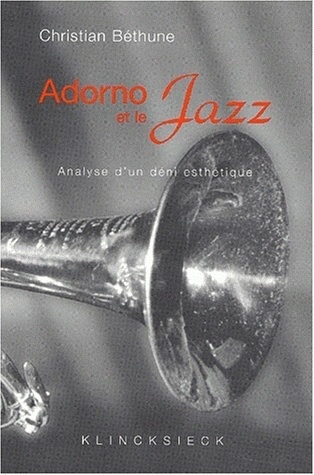As a student of Alban Berg, ardent defender of the Second School of Vienna, T.W. Adorno loathed jazz. This « timeless fad » which he also called a « modern archaism » was, in his opinion, nothing more than a pure product of the cultural industry — a deceptively liberating expression of the Afro-American community and a primitive regression to mankind's sado-masochistic stage. Curiously however, this philosopher, who normally was little inclined to dwell upon anything he abhored, would never stop — for nearly his entire life — making comments aimed at discrediting a music form that he contradictorily claimed enjoyed a « paradoxical immortality ».
Was a simple misunderstanding the cause of this virtual obsession ? Was he caught up in some sort of ambivalent obsessive-repulsive relationship ?
Although Christian Béthune does not fully elude such questions, neither does he have total confidence in sociological, psychological, or even psychoanalytical, explanations.
He prefers to seek out the reasons for this peculiar aversion among the fundamental precepts of Adornian aesthetics. Scarcely intimidated by the dialectical subtleties of this thinker of the Frankfurt School, he minutely scrutinises the texts, analyses (not without humour) seemingly irreconcilable points of view, and masterfully conducts an inquiry that leads him « to the very heart » of Adorno's philosophy.
This work, which ventures beyond a study on the conflictual, and ultimately ambiguous, relations that T.W. Adorno always sustained with one ot the greatest forms of musical expression produced in the 20th century, already serves as an introduction to an aesthetic of jazz.
Christian Béthune, whose Doctorate is in Philosophy, is currently teaching at Académie de Clermont-Ferrand. A long-time columnist with Jazz Magazine, he has also published many articles in Cahiers du Jazz, Revue d'esthétique, Art Press, Papel do Jazz and Copyright Volume, as well as several books on jazz and rap.




